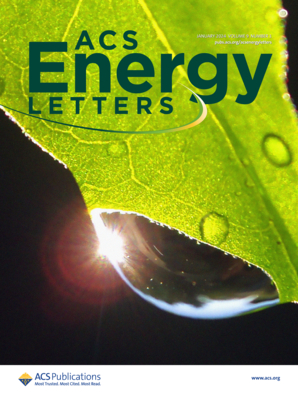Scalable Direct Recovery of Spent LiFePO4 with a Redox-Mediated Flow Cell
IF 19.3
1区 材料科学
Q1 CHEMISTRY, PHYSICAL
引用次数: 0
Abstract
The rapid increase in lithium-ion battery (LIB) usage has led to significant environmental challenges. Lithium loss is one of the most significant causes of capacity degradation in LIB. This study presents a novel redox-mediated electrochemical method for the direct recovery of spent LiFePO4 (s-LFP) cathodes from spent LIBs. Using anthraquinone-2,7-disulfonic lithium salt (AQDS-Li) as the redox mediator (RM), the process operates in an aqueous flow system, minimizing chemical consumption and secondary pollution. The RM electrochemically generated on the electrode reduces s-LFP in a separate reactor tank and restores lithium content in the material, making it suitable for reuse. The restored LFP showed stable electrochemical behavior, good rate performance across various current densities, and excellent cycling stability. This method offers a cost-effective, environmentally friendly and scalable solution for LIB recycling, significantly reducing the environmental footprint and promoting the efficient use of critical resources.

氧化还原介导的流动池可扩展直接回收废LiFePO4
锂离子电池(LIB)使用量的快速增长带来了重大的环境挑战。锂离子损耗是造成锂离子电池容量下降的最重要原因之一。本研究提出了一种新的氧化还原介导的电化学方法,用于从废锂中直接回收废LiFePO4 (s-LFP)阴极。该工艺采用蒽醌-2,7-二磺酸锂盐(AQDS-Li)作为氧化还原介质(RM),在水流系统中运行,最大限度地减少了化学品消耗和二次污染。电极上产生的RM在单独的反应器槽中减少了s-LFP,并恢复了材料中的锂含量,使其适合重复使用。修复后的LFP具有稳定的电化学行为,在不同电流密度下具有良好的倍率性能,并且具有良好的循环稳定性。这种方法为LIB回收提供了一种经济、环保、可扩展的解决方案,显著减少了环境足迹,促进了关键资源的有效利用。
本文章由计算机程序翻译,如有差异,请以英文原文为准。
求助全文
约1分钟内获得全文
求助全文
来源期刊

ACS Energy Letters
Energy-Renewable Energy, Sustainability and the Environment
CiteScore
31.20
自引率
5.00%
发文量
469
审稿时长
1 months
期刊介绍:
ACS Energy Letters is a monthly journal that publishes papers reporting new scientific advances in energy research. The journal focuses on topics that are of interest to scientists working in the fundamental and applied sciences. Rapid publication is a central criterion for acceptance, and the journal is known for its quick publication times, with an average of 4-6 weeks from submission to web publication in As Soon As Publishable format.
ACS Energy Letters is ranked as the number one journal in the Web of Science Electrochemistry category. It also ranks within the top 10 journals for Physical Chemistry, Energy & Fuels, and Nanoscience & Nanotechnology.
The journal offers several types of articles, including Letters, Energy Express, Perspectives, Reviews, Editorials, Viewpoints and Energy Focus. Additionally, authors have the option to submit videos that summarize or support the information presented in a Perspective or Review article, which can be highlighted on the journal's website. ACS Energy Letters is abstracted and indexed in Chemical Abstracts Service/SciFinder, EBSCO-summon, PubMed, Web of Science, Scopus and Portico.
 求助内容:
求助内容: 应助结果提醒方式:
应助结果提醒方式:


